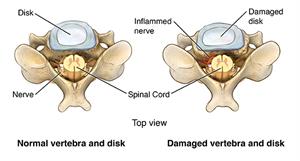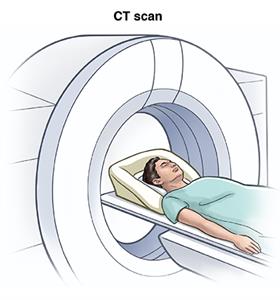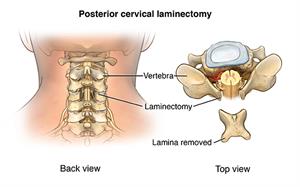Neck Pain
What is neck pain?
Because of its location and range-of-motion, your neck is often left unprotected and subject to injury. Neck pain can range from mild discomfort to disabling, chronic pain.
What causes neck pain?
Neck pain can result from many different causes--from injury, to age-related disorders, or inflammatory disease. Causes of neck pain and problems may include the following:
- Injury (damage to the muscles, tendons, and/or ligaments)
- Herniated disk in the neck
- Arthritis (such asosteoarthritis, rheumatoid arthritis)
- Cervical (neck) disk degeneration
- Congenital (present at birth) abnormalities of the vertebrae and bones
- Tumors

Symptoms
How is neck pain diagnosed?
Along with a complete medical history and physical exam, diagnostic procedures for neck pain may include the following:
- Blood tests. These tests can help determine the diagnosis of inflammatory disease.
- Electromyogram (EMG). A test to evaluate nerve function.
- X-ray. A diagnostic test which uses invisible electromagnetic energy beams to produce images of bones onto film.
- Magnetic resonance imaging (MRI). A diagnostic procedure that uses a combination of large magnets and a computer to produce detailed images of organs and structures within the body; can often determine damage or disease of internal structures within our joints, or in a surrounding ligament or muscle.
- Computed tomography scan (also called a CT or CAT scan). A diagnostic imaging procedure that uses a combination of X-rays and computer technology to produce images of the body. A CT scan shows detailed images of any part of the body, including the bones, muscles, fat, and organs. CT scans are more detailed than general X-rays.

How is neck pain treated?
Specific treatment for neck pain will be determined by your doctor based on:
- Your age, overall health, and medical history
- Your diagnosis
- Extent of the condition
- Your tolerance for specific medications, procedures, or therapies
- Expectations for the course of the condition
- Your opinion or preference
Treatment may include:
- Medication (to reduce inflammation and control pain)
- Rest
- Physical therapy
- Neck brace or immobilization
- Exercise
- Surgery

When should I call my health care provider?
Treatment for neck pain is recommended when the pain starts to prevent any future injury or damage.
Living with neck pain
Living with neck pain can be difficult. But the following treatments , often in combination, prove effective both immediately and over time.
To manage your neck pain, you may try medications, rest physical therapy and exercise.
Key points
- Neck pain can range from mild discomfort to disabling, chronic pain.
- Neck pain can result from many different causes--from injury, to age-related disorders, or inflammatory disease.
- Seeking medical advice as soon as possible after the injury will minimize future damage and inflammation.
- Once you have been treated for the initial injury, a program of physical rehabilitation may be necessary. It is important to follow through with your program and exercises to both strengthen and build muscles to support your activities.
- Using good body mechanics may prevent future injury.
Next steps
Tips to help you get the most from a visit to your health care provider:
- Before your visit, write down questions you want answered.
- Bring someone with you to help you ask questions and remember what your provider tells you.
- At the visit, write down the names of new medicines, treatments, or tests, and any new instructions your provider gives you.
- If you have a follow-up appointment, write down the date, time, and purpose for that visit.
- Know how you can contact your provider if you have questions.
Online Medical Reviewer: Fincannon, Joy, RN, MSN
Date Last Reviewed: 1/28/2014
© 2000-2016 The StayWell Company, LLC. 780 Township Line Road, Yardley, PA 19067. All rights reserved. This information is not intended as a substitute for professional medical care. Always follow your healthcare professional's instructions.